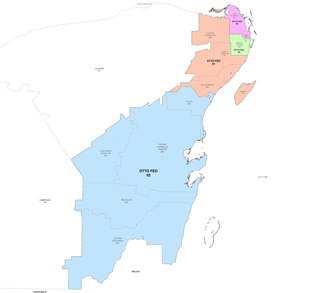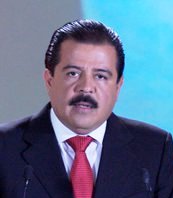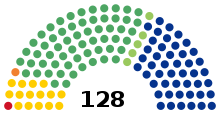
The first federal electoral district of Aguascalientes is one of the 300 electoral districts into which Mexico is divided for elections to the federal Chamber of Deputies and one of three such districts in the state of Aguascalientes.

The third federal electoral district of Aguascalientes is one of the 300 electoral districts into which Mexico is divided for elections to the federal Chamber of Deputies and one of three such districts in the state of Aguascalientes.

The first federal electoral district of Baja California is one of the 300 electoral districts into which Mexico is divided for elections to the federal Chamber of Deputies and one of nine such districts in the state of Baja California.

The first federal electoral district of Baja California Sur is one of the 300 electoral districts into which Mexico is divided for elections to the federal Chamber of Deputies and one of two such districts in the state of Baja California Sur.

The second federal electoral district of Baja California Sur is one of the 300 electoral districts into which Mexico is divided for elections to the federal Chamber of Deputies and one of two such districts in the state of Baja California Sur.

The eighth federal electoral district of Chihuahua is one of the 300 electoral districts into which Mexico is divided for elections to the federal Chamber of Deputies, and one of nine such districts currently operating in the state of Chihuahua.

The fourth federal electoral district of Coahuila is one of the 300 electoral districts into which Mexico is divided for elections to the federal Chamber of Deputies and one of eight such districts in Coahuila.

The sixth federal electoral district of Coahuila is one of the 300 electoral districts into which Mexico is divided for elections to the federal Chamber of Deputies and one of eight such districts in the state of Coahuila.

The first federal electoral district of Quintana Roo is one of the 300 electoral districts into which Mexico is divided for elections to the federal Chamber of Deputies and one of four such districts in the state of Quintana Roo.

The tenth federal electoral district of Chiapas is one of the 300 electoral districts into which Mexico is divided for elections to the federal Chamber of Deputies and one of 13 such districts in the state of Chiapas.

The sixteenth federal electoral district of Mexico City is one of the 300 electoral districts into which Mexico is divided for elections to the federal Chamber of Deputies and one of the 22 currently operational districts in Mexico City.

Eviel Pérez Magaña is a Mexican politician affiliated with the Institutional Revolutionary Party (PRI). After being the last Minister of Social Development from 2018 to 2019 during the administration of Enrique Peña Nieto, he dedicated to his private business and enterprises. Before being the head of the ministry he was its undersecretary of social development programs. Previously he was a Senator for Oaxaca during the 62nd Congress (2012–2015); in the Senate he was the president of the indigenous affairs commission. He was also elected to the Chamber of Deputies in 2003 and 2009, representing the first district of Oaxaca, and he served as the municipal president of Tuxtepec (2002–2003).
Ernesto Saro Boardman is a Mexican politician affiliated with the National Action Party (PAN). He served as a senator during the 60th and 61st sessions of Congress (2006–2012), representing Coahuila. He also served as a federal deputy during the 58th Congress (2000–2002), representing Coahuila's fourth district.
Antonia Irma Piñeyro Arias is a Mexican politician from the Institutional Revolutionary Party (PRI). She has served in the Chamber of Deputies on three occasions:

Alma Carolina Viggiano Austria is a Mexican politician from the Institutional Revolutionary Party (PRI).

César Augusto Santiago Ramírez is a Mexican politician from the Institutional Revolutionary Party (PRI).
Heriberto Huicochea Vázquez is a Mexican politician from the Institutional Revolutionary Party (PRI). In the 2000 general election he was elected to the Chamber of Deputies to represent the seventh district of Guerrero during the 58th Congress. He resigned his seat on 19 August 2002 and was replaced by his substitute, Lourdes Gallardo Pérez, for the remainder of his term.
Anabel Acosta Islas is a Mexican politician. A native of Cajeme, Sonora, and a graduate of the Sonora Institute of Technology, she has been elected to Congress for both the Institutional Revolutionary Party (PRI) and the National Regeneration Movement (Morena) but currently sits as a member of the Ecologist Green Party of Mexico (PVEM).

The sixth federal electoral district of Sonora is one of the 300 electoral districts into which Mexico is divided for elections to the federal Chamber of Deputies and one of seven such districts in the state of Sonora.

The twenty-fifth federal electoral district of the Federal District is a defunct federal electoral district of Mexico. Occupying a portion of what is today Mexico City, it was in existence from 1973 to 2018.















